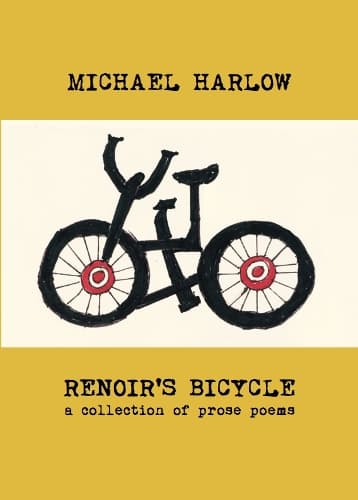Review: Renoir’s Bicycle: A collection of prose poems
Reviewed by Erica Stretton
Michael Harlow’s Renoir’s Bicycle, a collection of prose poems, occupies itself with a profound search for meaning. The collection reaches deep into mythology, religion, music, languages and art in this hunt, questioning the foundations of human existence and the stories that hold us together.
The poems here could be exceptionally heavy if they weren’t lifted by a playful style and light brushstrokes. In Touch, a wistful look at the physical interplay of memory and touch, the ending fulfils the reader with ‘When you were dying, those points of light still / in your eyes; and that gleaming smile, you said, ‘I think / that I will always be ten years old.’
At other times the author takes us to fairy-tale territory: ‘looking deep into the family mirror, I saw / someone shaped like a question mark’ (All the pianos in the wood). Throughout, a steady, unflinching commitment is made to examining Biblical themes.
Each poem here is a complete story; the author delights in the play of language, digging into the frameworks of life, bringing music to the page.
Baby piano
She said, from inside one of the lost books of the Bible,
‘I am without child. This has been going on for centuries.
Like a dry rain, I am so withered.’
He was being agreeable, and he hadn’t lost his faith
in the ministrations of the hovering angels.
Still. He wished and she wished and told their beads.
And so it came to pass, a tumultuous wind sweeping
through the Anatolian plain where they lived.
A Baby Piano. A mysterious blessing. And so it was
every lunar month with great, sometimes even rollicking
devotion, they celebrated the Baby Piano’s Birthday.
And they played on the white keys and the black keys
together, even when pebbles of rain played rackety
at the window. Isn’t this nice he said inside a thrilling
arpeggio. She said, from inside the looking glass glissando,
we are as Anatolian larks. Oh, the music of falling
into each other’s arms; that makes life again so liveable
they whispered to each other. And because it is time
to begin again, they take Baby Piano to bed with them.
Reviewed by Erica Stretton
